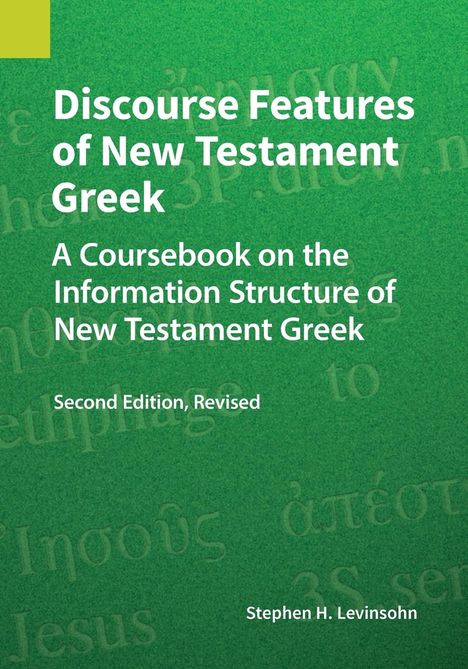Stephen H. Levinsohn: Discourse Features of New Testament Greek, Kartoniert / Broschiert
Discourse Features of New Testament Greek
- A Coursebook on the Information Structure of New Testament Greek, 2nd Edition, Revised
(soweit verfügbar beim Lieferanten)
- Verlag:
- SIL International, Global Publishing, 08/2024
- Einband:
- Kartoniert / Broschiert, Paperback
- Sprache:
- Englisch
- ISBN-13:
- 9781556714771
- Artikelnummer:
- 11943268
- Umfang:
- 414 Seiten
- Nummer der Auflage:
- 24002
- Ausgabe:
- Revised Edition
- Gewicht:
- 775 g
- Maße:
- 254 x 178 mm
- Stärke:
- 22 mm
- Erscheinungstermin:
- 9.8.2024
- Hinweis
-
Achtung: Artikel ist nicht in deutscher Sprache!
Weitere Ausgaben von Discourse Features of New Testament Greek |
Preis |
|---|
Klappentext
This coursebook is designed to be used in connection with lectures and discussion groups or in a self-instruction environment. The book takes a functional approach and builds on the principle that choice implies meaning. Each chapter presents one or more discourse features of Koine Greek that have been shown to make a significant contribution to the exegesis of the Greek New Testament. Part I discusses default orders of constituents in clauses, sentences and phrases, together with the significance of marked orders. Part II identifies the constraint that each common conjunction imposes on how readers are to relate the sentence concerned to its context. Part III considers patterns of reference including why, once participants have been introduced, they are sometimes referred to only in the verb and sometimes by means of a pronoun or noun phrase, as well. It also addresses the significance of omitting the article when referring to activated participants or concepts. Part IV describes some features that have the effect of backgrounding or highlighting information, such as the encoding of information in a participial or relative clause and the use of the historical present. Part V considers how different ways of introducing reported speeches reflect their status in stories. It also discusses the motivations for reporting conversation directly versus indirectly and the significance of introducing direct speech with ¿¿¿ recitativum.
The final part reviews criteria that may be cited to support or reject the segmenting of passages into sub-units. Readers need a basic knowledge of introductory Greek and discourse analysis. All examples in the text are provided with a word-by-word translation. Review questions and suggested answers are provided to assist in applying the principles. In this edition, the content has been extensively reviewed and polished, including errata corrections from the prior edition.


